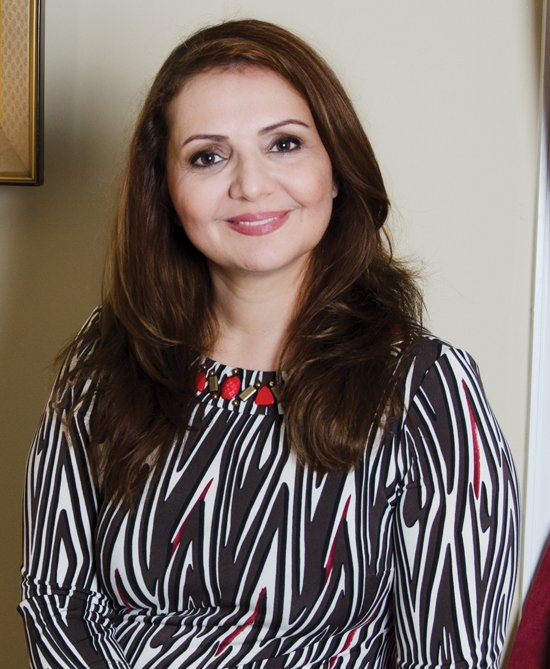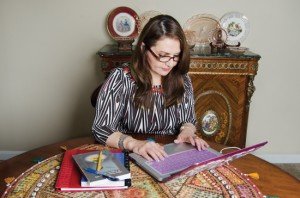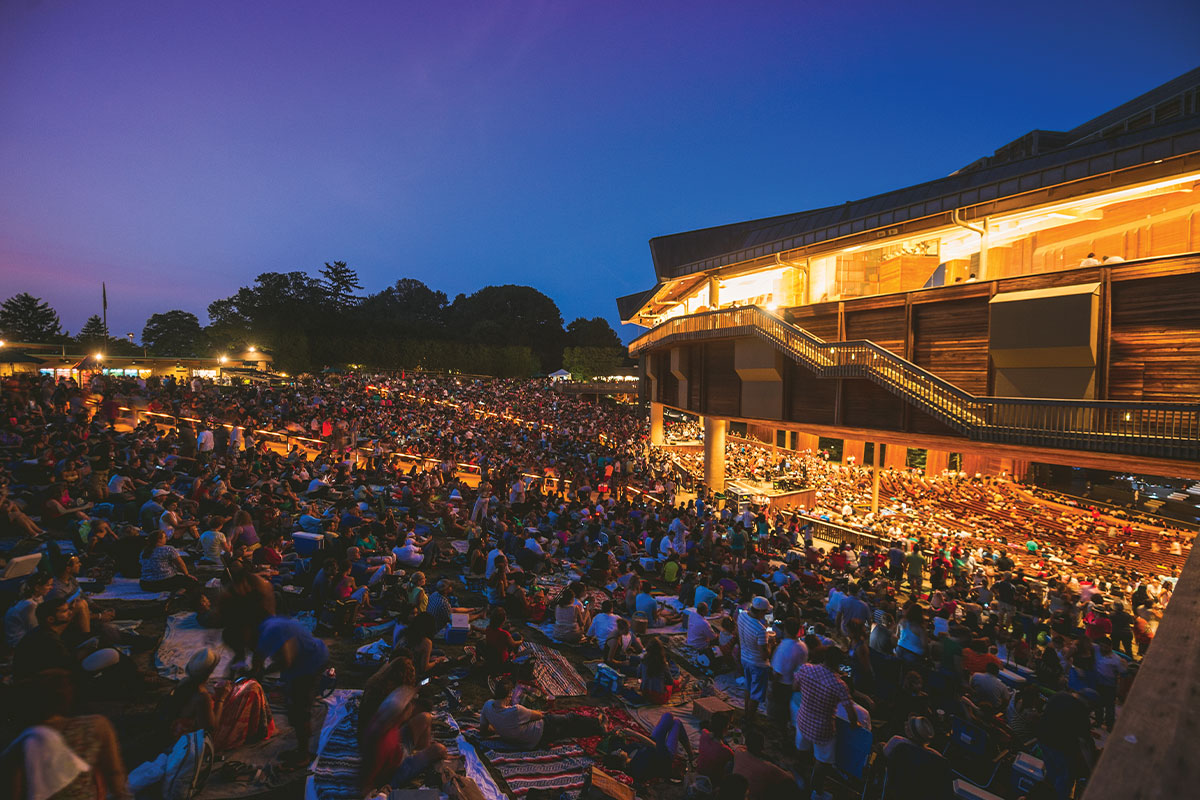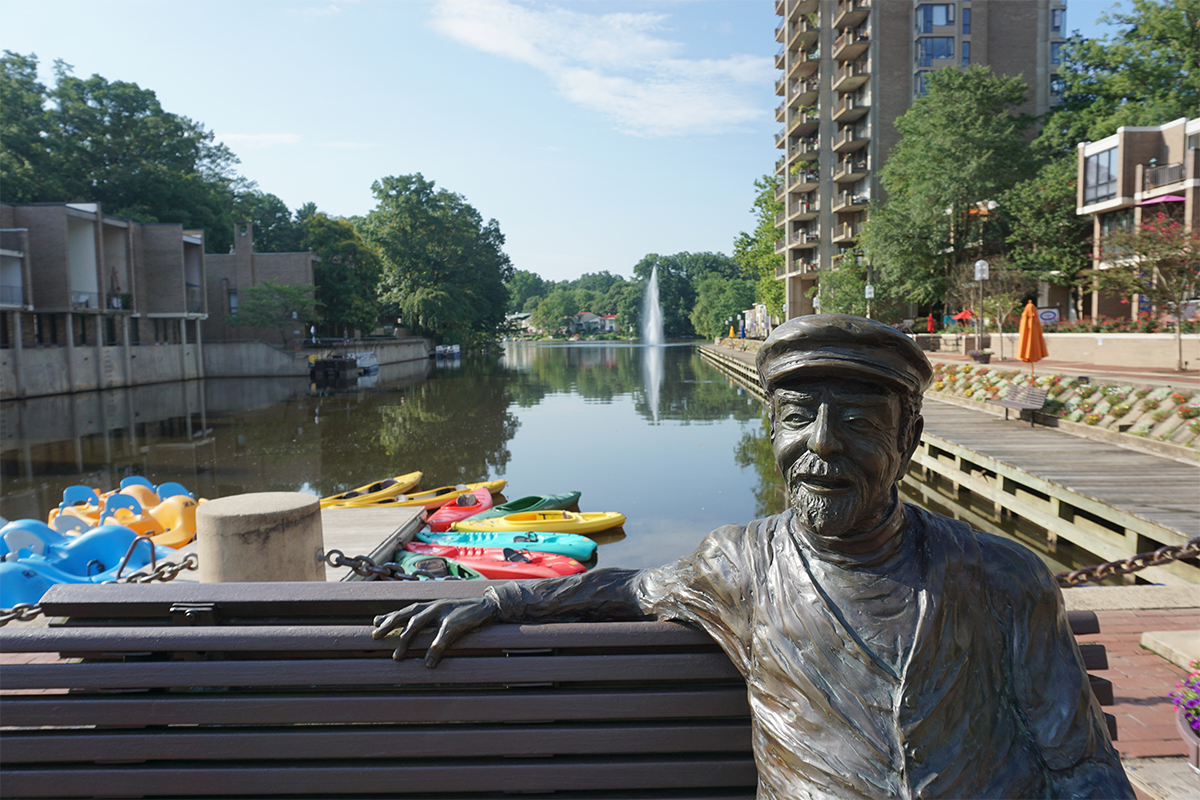One Woman’s fight from Northern Virginia against Iran’s oppressive policies.
By Kira Zalan • Photography By Andrea Castanon

Fariba Davoodi Mohajer serves gojeh sabz (green cherry plums from Iran) and apricots before taking a seat in her Oakton apartment. Small Persian rugs accent floors covered with American-bought furniture. Black and white family photos cover one wall; a print of a popular painting hangs on another. “I had to leave almost everything behind,” she says, explaining the mix of old and new. After brief pleasantries, Davoodi leans forward on the brick-red upholstered chair and brings up what she really wants to talk about: a recent speech by Iran’s supreme leader Ali Khamenei. Just days earlier, the 75-year-old cleric criticized gender equality at an Iranian university. Davoodi’s recounting of the event, like her energy, is calm but urgent.
Davoodi, 50, has called the Metro-D.C. area home since 2007, when she came to visit her oldest daughter Hanieh, a writer now living in Reston. In Iran, Davoodi was a journalist and a leading women’s rights activist—roles for which she’d been repeatedly harassed and detained by government authorities. Weeks after she arrived in the U.S., the mother of three learned that she was sentenced in absentia by an Iranian court for violating national security laws for organizing a protest. Faced with the prospect of arrest—and a failing marriage—she stayed.
Davoodi received a green card based on extraordinary ability for her achievements and her circumstances—one of several quota-based categories under the U.S. immigration system. Two years ago, she moved from Arlington to Oakton. Her modest two-bedroom, first-floor condo a fraction of the spacious multi-level house she shared with her husband in Tehran, a city of 7 million.
“It is small, but it is mine,” Davoodi says with pride and a Farsi accent. She often pauses to search for the right word in English. At home, she relies on her 27-year-old son, Ali, to translate. The recent University at Buffalo graduate lives with Davoodi and is looking for his first job. Both he and his 23-year-old sister Atieh, who studies biology at Northern Virginia Community College, joined Davoodi in the U.S. in 2009.
Armed with a pink MacBook covered in Disney princess stickers, Davoodi doesn’t look like a fugitive or a warrior. But for years she’s been waging a battle against laws she says are unfair to Iranian women: unequal rights in marriage and inheritance; unpunished honor killings; polygamy and child marriage.
By day, Davoodi works on human rights projects at a Washington organization that she requests not be published; she’s worried it might put Iranian counterparts in danger. By night, she devours everything out of and about Iran, writes commentary and chats on Facebook with her 4,600 followers—those willing to make their virtual connection to Davoodi public. “This is my life,” she says, reflecting on how much time she spends online.
She doesn’t follow local or U.S. news, but reveres America for its freedom and progressive approach to gender roles: “The base of democracy building is democratic behavior. Democratic behavior is not only in parliament or Congress, it is between normal people in the street, in daily life.”
Sometimes she posts on Facebook a photograph of a woman riding a bicycle around town or a man walking down the street with a baby carrier attached to his chest. Davoodi uses images of such typical American activities to challenge conservative views and laws in Iran.
Facebook users in Iran pepper her with cultural questions: Do American women get harassed on the street because of revealing clothing? Are gays really allowed to marry? Can Muslims really practice their religion in America? Some inquiries are friendlier than others—a few accuse her of misrepresenting the truth, most are grateful for the personal insight. She answers every question, often missing a night of sleep.
At times she plays therapist to desperate women and men. “Most people talk about life; their problems with life,” like anywhere, says Davoodi. But in Iran, that often means an individual at odds with what’s culturally or politically allowed.
Halil, a 29-year-old teacher and writer, chats with Davoodi over Facebook about being harassed by security police for his writing, which was determined to be subversive. He wants to leave Iran so he can write whatever he wants.
A 19-year-old mother named Minou, who’s been struggling with her family’s religious beliefs for the past two years, decided to stop wearing the chador, a conservative shawl that covers the face, neck and shoulders. Her angry father broke her computer. When Minou managed to sneak onto her uncle’s laptop, she told Davoodi that she was considering suicide. “The Internet was her only connection to the outside world,” says Davoodi, who can relate to the young woman’s isolation.
Davoodi was deeply religious at a young age, even as her parents disapproved of the zeal. At 15 years old, she chose to wear the hijab—a Muslim head covering that symbolizes piety and modesty. This was right after the 1979 revolution that overthrew a pro-western government that had banned religious veils and scarves in 1936. It would be a year before the new Islamic government would require all women to wear hijabs.
Years before Iranian revolutionaries stormed the U.S. Embassy in Tehran taking some 60 Americans hostage, the country had been priming for change. Davoodi hung out with older students, intellectuals, at libraries, where they criticized the ruling Pahlavi government for being corrupt, blaming the country’s poverty on the leadership. People wanted justice and freedom for all.
A few years after the revolution, Davoodi married and started a family. She earned a master’s degree in political science and, as did many Iranians, became increasingly disillusioned with where the country was headed. Morality police were arresting women for being immodestly dressed in public. Schools were segregated by gender. And family laws that protected women’s rights in marriage, divorce and custody were rolled backed. This is not what revolution supporters like Davoodi had in mind.
40 Days in a Secret Prison
Davoodi became an activist, criticizing the government’s misogynist policies and human rights abuses in newspapers and universities, calling for reform. When, in February 2001, authorities came to her home to arrest her, Davoodi resisted and was beaten severely. She recalls being in agonizing pain and watching men in plain clothes ransack her family’s house. Hours later, they carted away a truck full of books, CDs, articles, family photographs and other “incriminating evidence.” They also took Davoodi.
Blindfolded, she had her hands tied and her head forced down between her knees. She insists she was driven around in circles. “They don’t want anyone to know where the prisons are located, they wanted to confuse my sense of direction.” Iran’s secret prisons are off the books and reserved for political activists the regime considers “troublemakers,” Davoodi explains. They are thought to be located within residential areas or on military bases, away from official prison facilities.

When her blindfold was removed, Davoodi says she was standing in a windowless cell that felt like a grave. The space was as tall as she was, just over five feet, and three feet wide. Several blankets, one covered in dried vomit, would serve as a make-shift bed on the stone floor. The single light bulb burning overhead day and night would add to her disorientation.
From that moment, Davoodi would be addressed as “Number 65.” Sixty-five received the following instructions: “Never call the guard. If you need anything, including the bathroom, stick this piece of red paper through the slot at the bottom of the metal cell door. A guard should come and see what you want within one to two hours.”
Davoodi says she begged for a doctor to no avail. “My ribs hurt badly and I felt as though my kidneys were about to explode.” On the twelfth day of Davoodi’s detention, the guards finally brought a doctor into the interrogation room.
The only time Davoodi left her cell was for interrogation, which she believes took place at night. Davoodi was seated on a small bench or a school desk, facing a corner of the room, with a spotlight on her face. The interrogators, always two or three men, sat at a desk behind her. “You are a spy, a criminal. You’re helping U.S. government,” they shouted at her back. When she asked for an attorney, they mocked her: “You think you are in the U.S.?” When they did look for answers, the questions were ideological: “Do you believe in the supreme leadership of Khamenei? What about the religious doctrine underpinning the Islamic Republic?”
When such questions didn’t shake Davoodi they’d move on to her family. They promised to arrest her son and torture her husband. They accused her then 9-year-old daughter of being promiscuous. They told Davoodi that her mother was terribly ill and would likely die while she served 10 to 15 years in prison. Hours later, when they figured she was exhausted, they’d soften their tone. “If you want freedom, you have to agree to go on television and admit your guilt.”
Meeting for a recent interview at a Dupont Circle Starbucks, Davoodi recounts the details of her time in the secret prison unceremoniously. Did she ever consider falsely confessing to being a spy or to conspiring against the regime so she could go home? “Never,” she says, writing the word on a napkin, underlining it twice.
Prompted for more details, she describes the tactics she says were designed to drive her mad:walking her up and down a hallway on cold nights, wrapped in a blanket, always blindfolded. The guard that guided her by a piece of short rope would chant for what felt like hours, “We can help you.” Other times they’d seat her in the interrogation room alone and play the recorded phrase, “Woe to the forgotten captive,” over and over. Worse, she was sometimes placed in a room where she could hear screams of other prisoners being tortured. Based on the voices, she figured she was the only woman there.
One time, a guard led her to an underground basement and asked her if she wanted to be raped. What happened then? “I didn’t respond,” she says without elaborating.
In Iran, the Personal is Political
During the long days in her cell, between interrogations, Davoodi had time to draw parallels between her life at home and in prison. In her house, she was required to stay in the kitchen when her husband’s friends visited, sometimes three hours at a time. Davoodi would call her husband’s name to come get the tea she’d prepared. Bringing it out would be inappropriate to her husband because it would allow the male visitors to lay eyes on her.
This was a custom typical in conservative households, she says. In 2011, a conservative cleric reportedly declared open kitchens un-Islamic for this very reason.
The way Davoodi sees it, the current marginalization of women in Iran is “deeply cultural.” Her husband, who she describes as “traditional,” eventually took the kitchen rule a step further, explaining that his friends should not even hear her voice and in the future, she should not call his name but instead knock on the kitchen door to let him know the tea was ready. In prison, when Davoodi was told that she should never call for the guard, she wasn’t surprised. “I realized that what the guards and my husband wanted was to silence me. It was important to them that I didn’t even hear my own voice.”
Davoodi’s marriage was deteriorating. “We just didn’t get along,” she says, dismissing any suggestion of a connection to her political activism or her evolution from a teenage bride to a famed human rights activist.
In June 2006, hundreds of women took to the streets of Tehran, demanding equal rights. Davoodi, along with other organizers, was arrested and released on bail. The same summer, the women launched the One Million Signatures Campaign, going door to door collecting signatures for a petition asking the parliament to reform discriminatory laws. The following year, Human Rights First, a U.S.-based nonprofit organization, described the campaign as “the most powerful pro-reform movement in Iran today.”
But eight years since, little had changed in Iran, Davoodi laments at her Oakton home. Women still don’t have equal inheritance rights. A mother only has custody of her children during the first seven years of their lives and then the rights go to the father, Davoodi says. It’s legal for girls to marry at 13 and boys at 15, but today a court can grant permission to allow a girl to be married at 10 years old. “We are having a campaign to raise the age for girls,” Davoodi says.
There’s another law that’s particularly personal to Davoodi: Only the husband can file for divorce. A few months after her bail, and just before a trip to Ireland, Davoodi had a decisive conversation with her husband. “He promised we’d get divorced when I returned,” she says. “But I didn’t believe him.”
Davoodi is scant on details of her marriage, but she shutters at a Google image of her husband and turns away. She’s publicly commented on the prevalence of domestic violence against women in Iran but leaves intimate details of her home life vague.
Making Tough Choices
In Ireland, alone on a beach, Davoodi had the overwhelming urge to remove her hijab in public for the first time in 30 years. Once a symbol of her faith, it had now become to her a symbol of oppression. It took hours to overcome the fear of secret police snapping a picture and discrediting her on Iranian state television. Her husband would find out, too. There, 3,000 miles from home, she summoned the courage and tugged the scarf off her head, letting it fly into the waves. She cried for hours. “For a moment, I felt that there was no greater pleasure in the world than the feeling of the wind in my hair.”
In 2007, Davoodi traveled to the United States to accept a prize from Human Rights First and took the opportunity to visit her firstborn. Thirty-one year old Hanieh, a poet with a French literature degree, had moved to Washington a few years earlier with her husband, an Iranian dissident who was held in the same secret prison as Davoodi in 2001.
Here, Davoodi would make another tough choice. She wasn’t going back. She wanted freedom so badly—from her husband, from her government, from all the rules—that she was willing to leave everything behind. She utilized the same channels that allowed her son-in-law to stay in the country. She was recognized by prominent think tanks as a human rights expert and granted a green card.
The difficulty of starting over in a new country with a new language was mixed with moments of pure joy. There was the first time she rode a bicycle, which women in Iran do only in segregated parks. “I felt so liberated.” She shed her drab, conservative clothing, preferring red color palettes. Her first bike was dark pink, and she rode it nine miles to work every day when she lived in Arlington.
“I’ve never felt as a stranger here,” she says of her adopted home. She adds that Iranians—the people, not the government—are open and accepting like Americans. “The people and the government are not one and the same.”
Despite the criticism she’s known for, Davoodi talks about her home with nostalgia. “I’d love to go back. But I’d go to prison for a long time.” There’s the sentence the court handed down for her role in the 2006 protests. Moreover, Davoodi’s husband, who has remarried, still hasn’t granted her a divorce.
Until the laws are changed, she’d need his permission to leave the country.
In her Oakton home, Davoodi logs on to her MacBook and once again checks the Farsi websites for developments.
(August 2014)




